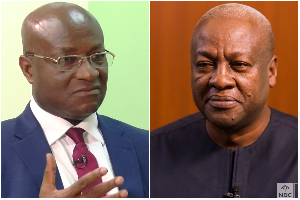Vice-President Dr Mahamudu Bawumia has said the Akufo-Addo government has “tamed” the cedi from its high depreciation.
The “exchange rate depreciation has been tamed”, he said on Sunday, 22 December 2019 when he addressed the governing New Patriotic Party’s National Delegates Conference at the Ghana International Trade Fair Centre.
“I know our opponents want to say that we have not managed the exchange rate. Well, they just are not reading the data”, Dr Bawumia said, adding: “If you look at the data, you will know that the government of Nana Addo Dankwa Akufo-Addo – when you look at the annual average depreciation of the cedi – since 1992, our government is the second best-performing; the first is the government of President J.A. Kufuor during 2005 – 2008”.
“So, if we have seen an annual average depreciation of our currency of 8.7 per cent and when NDC was in power between 2013 and 2016, the average annual depreciation rate was 18 per cent, we are at 8.7 per cent, you’re at 18 per cent and you’re telling us we cannot manage it [cedi] well; you must be joking”, the Vice-President told the biggest opposition National Democratic Congress (NDC).
Just recently, a vocal NDC MP, Mr Isaac Adongo, said the cedi had fallen by 18 per cent and wondered what the Vice-President, who, a few years ago, said he had arrested the fall of the cedi, was doing about the situation.
According to the Bolgatanga Central lawmaker, the shortage of the US dollar and a lack of confidence in the Ghanaian economy are the causes of the free fall of the cedi.
In September 2018, Dr Bawumia, while addressing a town-hall meeting on the government’s achievements in the first 100 days, said the free fall of the cedi had been arrested, and the keys given to the Inspector-General of Police (IGP) for safekeeping.
“When we came in, it [cedi] was running, essentially we have arrested it and the IGP has the keys, he’s locked it up, we want to make sure we pursue sound policies to keep the cedi stable, it has appreciated for this year,” Dr Bawumia stated at the time.
But two years on, the cedi has continuously depreciated against the major currencies, especially the US dollar.
As of Friday, 20 December 2019, FX-rate said the dollar-cedi ratio was $1: GHS5.72.
According to Mr Adongo, the situation exposes the pressure that the economy is enduring and the risks that the pale nature of the Bank of Ghana’s reserves are posing to the entire country.
In a write-up, the opposition lawmaker said Dr Bawumia, President Akufo-Addo and the entire Economic Management Team, have no clue what is happening, least of all having a solution to the plight of the importer.
He noted that what the government and the Bank of Ghana should be doing is to implement policies and programmes that engender confidence which will signal to the international community that Ghana will be able to meet her foreign currency demands.
“Dr Bawumia and the Economic Management Team must know that since the exit of the IMF, which was a confidence booster, reckless spending has been the order of the day at a time when revenues have been weak and underperforming in a manner that embodies the incompetence that PR has been used to hide,” he stated, adding: “This does not inspire confidence and it explains the increased sell-offs and mass withdrawals from the Ghana bond market in recent times.”
Mr Adongo wants the government to stop hiding the truth about the fall of the cedi and fix the problem.
Below is Mr Adongo’s statement:
Hon Isaac Adongo writes...
Shortage of US dollars and lack of confidence cause of cedi’s free fall
Between October and December, the cedi has endured bouts of depreciation against major world currencies at a time when increased demand for the US dollar, the British pound, the euro and the CFA France, among others have been met with under supplies. As of 18 December this year, the Bloomberg terminal quoted the cedi depreciation at around 18%, with GHS5.8 equaling one US dollar. Although the year is still grinding to an end, the current depreciation rate beats the rates recorded in 2016, 2017 and 2018.
It now begs the question why especially when it is happening under the nose of the all-knowing Dr Bawumia, the Walewale Adam Smith.
The situation further exposes the pressure that the economy is enduring and the risks that the pale nature of the Bank of Ghana’s reserves are posing to the entire country.
The rate of depreciation in the last three months has been worsened by the increased repatriation of dollars by foreign investors in Government of Ghana cedi-denominated bonds.
This is supported by data released by the Bank of Ghana. They show that Ghana's capital and financial accounts, which received a boost to net inflows of $2.6 billion in March 2019 as a result of the 2019 Eurobond proceeds, experienced significant decline to $1.5 billion in September 2019.
Business News of Monday, 23 December 2019
Source: classfmonline.com

















